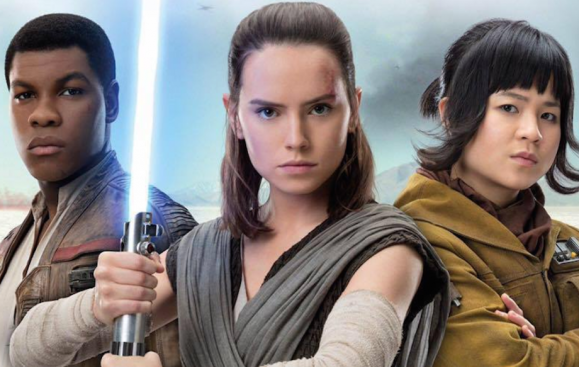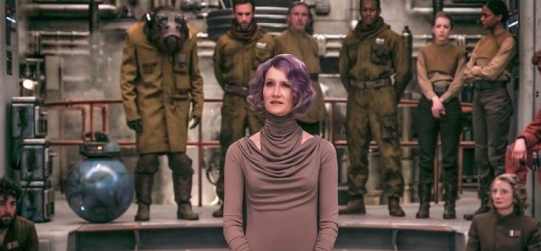
John Boyega as Finn, Daisy Ridley as Rey, and Kelly Marie Tran as Rose Tico in The Last Jedi
NOTE: This post is full of spoilers.
“This is not going to go the way you think.” — Luke Skywalker
Star Wars has always had its finger on the pulse of the cultural fear of the moment. In the original trilogy in the 1970s and early 80s, it was The Man– an evil establishment that needed to be purified by a younger generation. In the prequels of the 90s, it was evil corporations secretly colluding with a corrupt government to create endless war.
Now, in early 21st century America, the villain is an unstable young white man who had every privilege in life, yet feels like the world has wronged him. Unbeknownst to his family, he finds and communicates with a faraway mentor who radicalizes him with a horrific, authoritarian ideology. By the time his family finds out, it’s too late, and now this unstable young white man has this horrific ideology, access to far too many weapons, and the desperate desire to demolish anything that he perceives as a threat– or is told to perceive as a threat.
Star Wars has always pushed at the boundaries of its culture. Princess Leia was mainstream filmmaking’s first self-rescuing princess, and the films were unstinting in depicting her importance to the military strategy of the Rebellion, reflecting an incipient 70s feminism. The prequels were clear that we were all complicit in a corrupt system whether we admitted it to ourselves or not, symbolized by noble Jedi finding themselves leading an army of slave clones that were purchased from part of a massive military industrial complex. For all the films’ faults– and they are legion– this was a stunning accusation, and played to the 90s’ growing concerns of big business’ influence on government.
The new films are again at the vanguard of cultural concerns, but push harder and more subversively than any of the previous films. Above all else, The Last Jedi is about smashing patriarchal white supremacy– smashing it to the ground and starting over– and I am here for it.
While the earlier films were about the need to purify corrupt systems, the new ones are about smashing everything and starting over.
At every turn, the new films are about “letting the past die.” At its most broad and obvious, this means killing off the older generation and handing the narrative to the new. The Force Awakens killed off Han, which was no surprise as Harrison Ford had been badgering them to kill off Han Solo since Empire. Then The Last Jedi turned a hard corner by killing off Luke when everyone expected to lose Leia due to the loss of the great Carrie Fisher. Luke sacrifices himself in one last spectacular moment of force-wielding brilliance in order to save Leia and the Rebellion. This kind of sacrifice is something we’re used to seeing from extraordinary female characters (see every extraordinary woman from Charlotte in Charlotte’s Web to Eleven in Stranger Things). In TLJ, the central white male hero of the original films dies to save an exceptionally diverse, gender-balanced group of people who are, as Poe says, the “spark that will light the fire that will destroy the First Order.” Not “save the galaxy”; not “save the Republic.” This is not about saving something from corruption. It’s about ending the old order and creating something completely new.
As the older generation dies, the older way of doing things dies as well. Luke can’t bring himself to burn down the tree containing the sacred Jedi texts, so Yoda force ghosts in and does it for him, cackling, telling Luke that Rey already has “everything she needs,” then dropping this bit of heartaching profundity: “We are what they grow beyond. That is the true burden of all masters.” Anyone who has ever been a teacher or a parent understands this most painful and exhilarating of truths, but Yoda says it as the foundational texts of the Jedi order burn (as far as Luke or the audience know at that point). “We are what they grow beyond.” Not just us, but our old ways. Specifically, the old ways of hierarchical privilege.
Luke believes the Jedi order needs to die for this very reason. “The Jedi don’t own the force,” Luke says. The force is in everyone. Leia reflects this as well. “Why are you looking at me? Follow him,” she says, handing leadership to a random pilot who came from nowhere to become central to the Resistance. And although I am the first person to sign up for Team Leia– she was more than worthy of every inch of her power in the Rebellion– the door opened for her because she was part of the royal family of Alderaan. Her mother was the Queen of Naboo. Poe Dameron’s mother was a Rebel pilot. As the Rebels follow Poe, waiting for them on the other side is Rey, whose parentage was the subject of feverish speculation. Certainly she must be someone— she must come from some kind of peerage, pedigree, or privilege to be so special. But she is nobody from nowhere, daughter of unsavory junk traders who sold her for booze and died on Jakku. The force belongs to everyone, not just the pedigreed.
Privilege is handily dismantled wherever we try to create it. Rose Tico is awed by meeting Finn, now a hero of the Resistance, only to have her hero worship dashed when she realizes Finn is trying to escape. Finn comes from nowhere– one of many nameless troopers stolen as small children. Rose, as well, comes from nowhere– daughter of miners who now works as a tech for the Resistance. Some have criticized the Finn/Rose subplot, but thematically, the meaning is critical– these young Rebels are the new generation who will build the new society on the ashes of the old. They’re played by actors of color. Rose is respected by Finn for her expertise and quick thinking as a matter of course, not as a reveal (“Oh look! The pretty girl is actually smart!” or “That competent person took off their helmet and HOLY CRAP IT’S FEMALE”). When she falls for Finn, it’s not the usual trope of Hero Wins Sexy Woman, and was therefore criticized for being “shoehorned in.” Rose wasn’t wearing a low-cut top; we never saw Finn ogling her; we never saw the camera linger over her ass. We were never given the signals “SEE HER AS A SEX OBJECT,” so her love for Finn is “shoehorned in.” But this is the stirrings of the new society. Any idiot can ogle a woman’s ass, but the man who automatically respects a woman’s expertise is well worth falling for. While Leia and Poe are trying to save the Resistance on one front, Finn and Rose represent what they’re trying to save.
The Resistance is impressive in its casual diversity. Women and people of color are valued for their expertise as a matter of course; nowhere does the film congratulate itself on its diversity by making a huge point of highlighting it, demonstrating white male benevolence by the generous inclusion of women and people of color, positing a white male audience nodding along, agreeing that we are so wonderful for allowing our White Male World to donate a very small corner for the Less Fortunate. The Resistance is naturally diverse, and no one even seems to notice. That is masterfully subversive.

Vice Admiral Holdo (Laura Dern) addressing the Resistance in The Last Jedi
It’s not enough to destroy the old order from without. The Last Jedi demands that we examine our own complicity in the corruption of the old ways. Poe’s belief that all problems can be solved by shooting something down is shown as dangerous when unchecked; it’s the same toxic masculinity wielded by Kylo Ren, and a mainstay of war culture. The film indicts war culture and toxic masculinity throughout. Leia slaps and demotes Poe for sacrificing lives to bring down a dreadnought instead of escaping as ordered (“dead heroes. And no leaders”). Later, after his failed mutiny, she tells him that Holdo was more interested in “saving the light rather than looking like a hero.” But nowhere is the struggle against our own complicity with war culture more prominent than when Benicio Del Toro’s amoral DJ reveals to Finn and Rose that the “worst people in the galaxy”– the wealthy arms dealers who congregate at the Canto Bight casino– make their money selling weapons to both the First Order and the Resistance.
The Last Jedi has a clear message: The nearly all-white, overwhemingly male, privilege-based way of thinking that celebrates war culture and toxic masculinity and that created the First Order has to go, both in the larger world and as it’s internalized in our hearts and minds, and in its place will be something entirely new, created by diverse young people who are walking away from war culture, walking away from toxic masculinity, walking away from systems of privilege. What new society will they create? We don’t know. But we do know that old ways of thinking have failed us in every possible way. The wisest of the older generation, like Luke, have known this for a long time. The selfish, small-minded, hateful, and power-hungry in the older generation will continue to hunt and seduce the next generation, but the light still stands. No matter how much power they accrue, no matter how many angry young white men they convince we are the enemy, the light still stands. The future is brown, and female, and brilliant, and fierce, does not give even one single fuck about the way things used to be.
Those who wanted a safe and comforting Star Wars movie are understandably upset. The Last Jedi is anything but safe. It’s as subversive as it gets, and I am here for it.
P.S. Dear Lucasfilm:
Please attack cisheteronormativity in your next film.
Cackling Along with Yoda,
Melissa